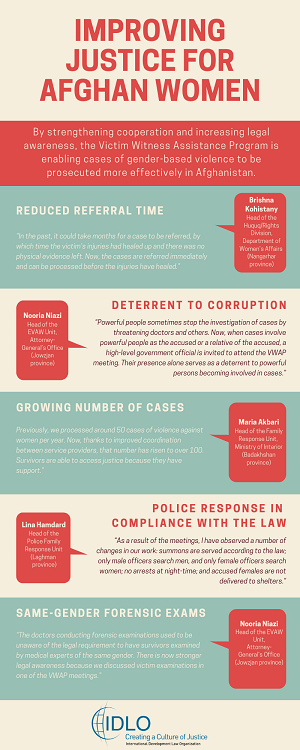| Click to enlarge image |
Patriarchal patterns are deeply embedded in Afghan society. Women who seek assistance with resolving criminal matters often find the deck stacked in favor of the male perpetrator of the crime who, in most cases of gender-based violence in Afghanistan, is an intimate partner or family member. A widespread lack of confidence in the court system and disjointed functioning of justice sector branches further compound women’s struggle to obtain a fair justice outcome.
The Victim Witness Assistant Program (VWAP) in Afghanistan has been strengthening coordination between criminal justice professionals who provide services to survivors of gender-based violence, thereby ensuring a smoother and more effective legal process and improving justice for Afghan women.
As part of its program to support access to justice in Afghanistan, IDLO has been facilitating justice sector collaboration through multi-stakeholder VWAP meetings across six provinces (Kabul, Herat, Balkh, Bamyan, Badakhshan and Nangarhar). During the monthly meetings, criminal justice stakeholders – including prosecutors, defense advocates, police officers, medical professionals, counsellors and shelter workers – have an opportunity to learn about their and their counterparts’ roles and jointly review cases. The participants then discuss strategies to ensure cases are prosecuted effectively and victims receive the care and protection they need.
“The VWAP brings together criminal justice professionals to educate them on the roles and responsibilities when it comes to prosecuting cases of gender-based violence,” said IDLO Senior Advisor Leslie Schneider. “Once they understand the boundaries of their professional ‘lanes’, we can encourage them to work within those lanes to ensure that victims and witnesses have access to justice through Afghanistan’s formal legal system.”
Depending on the nature of the case – which could include domestic violence, harassment and persecution, rape, forced prostitution and self-immolation, as well as forced and underage marriage – victims can receive legal advice, be referred to a prosecution office or defense attorney, or get sent directly to a hospital or shelter.
Anecdotal feedback from recent months has shown that by strengthening cooperation and increasing awareness of the law, the VWAP is enabling cases of gender-based violence to be prosecuted more effectively in Afghanistan (click on the infographic to read more about what VWAP participants have said).
Lina Hamdard, head of the Police Family Response Unit in Laghman province and one of the VWAP meeting participants, praised the opportunity to interact with other stakeholders: “These meetings changed my professional life because the discussions have helped me understand my role and responsibilities. I have developed relationships with other service providers that help me act more skillfully and strive for better communication with relevant organizations.”
Image credit: United Nations / Eric Kanalstein



